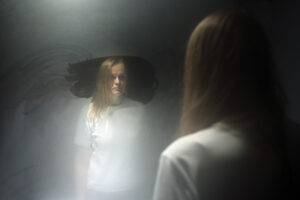Mirror Characters

In 1964, when I was eight, a high school basketball team from Southern Illinois made it to the championship game of the state tournament. This happened at a time when all the schools in the state, no matter their size, competed for the crown. For tiny Cobden, population 918, to make it all the way to the championship game, the feat was amazing. The school only had 147 students.
My parents and I had moved from a similar tiny place in southeastern Illinois, a little over two hours north of Cobden, to Oak Forest, a southern suburb of Chicago, only a year before. I was still trying to assimilate, still trying to figure out how to transform myself from a country boy to a city boy. I knew the players on that Cobden team, and I knew the town itself, though I’d never been there, because I’d spent my time in similar places across the downstate part of Illinois. I’d gone to basketball games in cracker box gyms. I’d seen the players eating hamburgers and drinking milkshakes. I knew some of them lived on farms, and some of them lived in wood frame houses in these itty-bitty towns that had no stoplights. I knew the smell of their houses on cold winter nights—bacon grease, boiled vegetables, cigarette smoke, and kerosene fumes. I knew the Butch Hair Wax they used on their crew cuts and flattops. I knew the barbershops and cafés and grocery stores and gas stations and pool halls where people talked about the high school teams. I knew because I was a member of that tribe.
In Oak Forest, though, I was an outsider, which explains how I came to be caught up in Cobden’s David and Goliath story. When I saw that team, I saw myself and the place from where I’d come. I saw my story in their story.
I have a vivid memory of that championship game because I wasn’t supposed to watch it on television. I was sick with the three-day measles and the chickenpox, and my doctor told me I couldn’t watch television because, if I did, I might harm my vision. I lay on our couch, and from time to time, I glanced at the television set, hoping Cobden would win. At halftime, I went to sleep. My parents woke me after the game was over, and they told me Cobden had lost to Pekin by five points. I marched off to bed, disappointed.
The story of that Cobden team surfaces from time to time over fifty years later, and each time it does, I recall that night in 1964 when that game was more than a game to the eight-year-old I was—this shy kid who often felt far away from his rightful home and who wanted more than anything to fit into his new city way of life.
We want to see ourselves represented in the world at large. For writers of fiction, this can mean providing our characters with an opportunity to see themselves in other characters. How can we bring a story to a moment when the main character sees something of the self in another character they always assumed was radically different from them? When writing creative nonfiction, the same strategy can apply. Can you recall moments from your life when you were surprised to notice something you shared with a character you always felt distant from?
I wasn’t supposed to watch the television that night in 1964, but I couldn’t resist. Each time I looked, I saw myself, and I saw my family, and I saw the place from where we came, a place to which we’d one day return, and I’d play high school basketball in those small-town gyms, and as the days and years went on, there’d be a feeling of coming home. It’s a feeling that remains to this day. Although I’m a very different person than I was during my high school days, each time I’m back in that part of the world, I’m reminded of who I was, this small-town boy who never leaves me.
Lovely story, Lee. I moved from a small Missouri town this/close to the St Louis Airport. At night, planes roaring overhead rattled the windows in the tar paper tiny house on a dirt road, a long walk to 3rd grade. We moved that summer to Deerfield, IL a suburb north of Chicago. My mother, who hated teaching middle school, was suddenly an English teacher in our new “village” and my father, who had lost our house, the rental house, and the two greenhouses they owned, finally had a job as a traveling salesman in the western midwest, gone Monday through Friday. We lived in a crummy little rental, a split level, but at least we had closets! Many of the kids had money, nearly all had more. They were different, too. Didn’t have a Missouri twang, had bicycles and roller skates, and wore nice clothes. Things did not go well for me, a fat, silent girl, poorly dressed who didn’t pay attention in school, writing my thoughts backwards from right to left, lefthanded writing, mirror writing, as I was so afraid. In the last row, needing glasses, I could never see the board and so I either wrote or read a book under the desk. Not that anyone cared. We stayed in Deerfield until after my marriage at 22, after my father dumped my by then disabled mother for a 20 years younger woman from the same hometown in Indiana where he grew up. ETC. Sorry so long!
We carry our stories with us, don’t we, Virginia. Thank you for sharing yours.